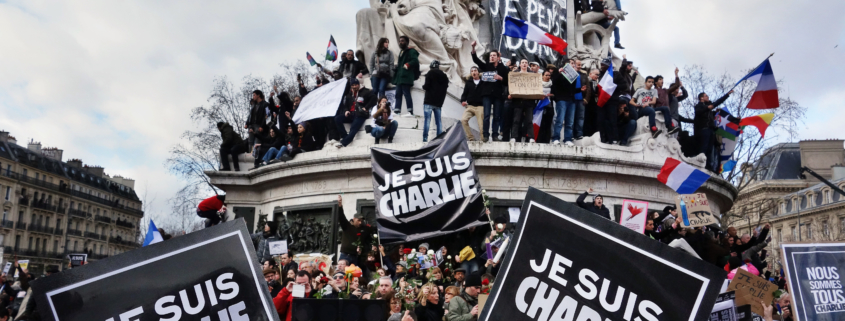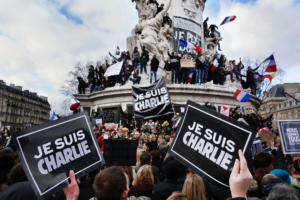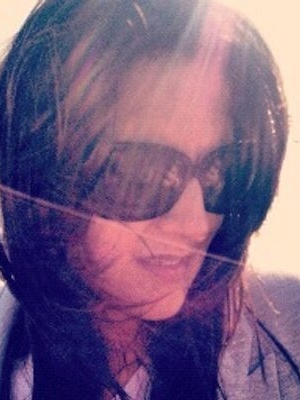Nous Sommes Charlie (and Muhammad)?
There was much debate around the PEN American Center’s decision to honor the satirical cartoon newsmagazine Charlie Hebdo with the Freedom of Expression Courage Award at its literary gala earlier this month in New York City. Critically-acclaimed writers who were scheduled as hosts declined to attend. A little over two hundred well-esteemed writers and poets signed a letter of protest against the award, including Teju Cole, Rachel Kushner, Ben Lerner, Joyce Carol Oates, and Vijay Seshadri. They detailed in their letter concerns about Charlie Hebdo’s work “valorizing selectively offensive material: material that intensifies the anti-Islamic, anti-Maghreb, anti-Arab sentiments already prevalent in the Western world.”
A debate swirled (and still swirls) from PEN’s decision: Why were these defectors of the literati wrong in taking their stance, and why were they in the right to do so? Is this an issue of promoting freedom of expression, or did Charlie Hebdo traffic in hate speech? Shouldn’t PEN be able to take a stand against violent acts on writers and artists committed by extremists, and isn’t that its mission statement? Should we all take a crash course in understanding why and how Charlie Hebdo’s satirical cartoons are made?
What the writers’ dramatic stance clarifies is the validity in speaking up and making controversial opinions known. Whether or not these literary artists were “right,” the truth is they took the opportunity of a global stage to make a statement against Islamaphobia. Was this the best opportunity to do so? That is also up for debate. But because they did take a stand, it called to attention the viable concern that Islamaphobia and prejudice against immigrants is growing, especially in the Western world.
There are challenges in reaching a well-rounded perspective on a complex issue like this. I try and avoid a knee-jerk reaction on a news or media event that “Of course they were wrong,” or, “Of course they were right.” It’s never as simple as that. Reaching a conclusive opinion often takes a little more time than scanning news articles or Facebook status updates.
Social justice is a primary component of the MFA Creative Writing program at Antioch. For me, social justice involves being connected to what’s going on in the news and media. My undergraduate degree is in News-Editorial Journalism (old-school print journalism) from the University of Illinois at Champaign-Urbana. It was my first experience in studying writing, for better and for worse. During one of my first journalism classes, I remember asking my grizzled, suspender-wearing professor, with his clean white shirt rolled up at the sleeves, if I could borrow a pen. He growled back, “Aww, what’s a reporter without a pen?” Words to take to heart.
When I studied journalism, I learned that objectivity is the apex to which you write. The more you take yourself out of the story, the better the story. (Over time, I realized that this is not the most ideal self-definition to have as a writer.) Writers and journalists are only human, and it’s inevitable they bring their own biases to a story, whether an op-ed or an investigative report. Knowing what your own personal biases are concerning an issue you’re writing about—in terms of politics, race, socio-economics, or simply the limits of your personal knowledge—has an effect on what and how you write. This also goes for critical reviews of books or other arts. It’s a dubious practice for book reviewers to just outright say “I hate it” or “I love it,” for example. Gut instinct speaks to your emotional response, but critical assessment communicates more than just an opinion, and is more useful information for a reader.
In journalism, it’s easy to become your own best skeptic about your writing (and worst enemy). For every step in reaching a well-researched and conclusive opinion, you have to ask yourself: what would be the opposing point of view here? For example, if I’m assuming that those who objected to PEN’s decision to award Charlie Hebdo were in the wrong, what tangible evidence do I have to assume I’m right? (Journalists can also never, ever assume anything—otherwise they run the risk of ending up in deep, bottom-of-the-ocean trouble, much like Sabrina Erdely for her piece on campus rape for Rolling Stone.) As a research and writing tool, it’s valuable to draw from as many reliable sources as possible to inform your personal opinion and interpretation of a topic or issue.
The value of old-school news-editorial journalism is changing. Readers bring their own set of preferences for what outlets they choose to read, follow, and listen to on a day-to-day basis. There are a wider range of perspectives available to readers than the traditional stereotype of the hard-drinking, notebook-and-pen-in-hand, white male news reporter on the beat. But media and news consumers can also get overloaded with options for where to get their “news of the day,” without synthesizing that information into decisive opinions.
Writers and media consumers alike can benefit from having some knowledge of how a journalism story is put together. The Poynter Institute is one free and online resource available for learning about journalistic writing and how to form a critical perspective, as well as constructive opinions on issues that impact the world around you.
Erin Anadkat is a MFA candidate in Creative Writing at Antioch University Los Angeles. http://www.erinanadkat.tumblr.com/, https://twitter.com/erinanadkat







